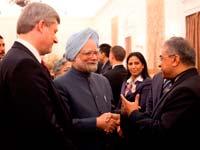Deals pave the way for Harper’s passage to India

India and Canada are exploring opportunities in joint defence research and development and have identified early warning and response networks, advanced materials, and space technologies as some of the areas where they have a strong alignment.
Discussions on this were held by Defence Research and Development Organisation chief Vijay Kumar Saraswat during his visit to Canada Oct. 10-15, a press statement said.
Saraswat and a DRDO delegation attended the Indo-Canadian workshop on ‘Frontiers in Science and Engineering 2011’ at York University and visited and discussed technologies of common interest to the two countries with Canadian agencies and experts from academia, science and technology organisation and industries.
The workshop was also attended by delegates from Indian Space Research Organisation (ISRO) and Indian universities, apart from those from Canadian institutions.
“To proceed further, the two sides have agreed to outline future course of action within a month and to hold the next workshop in India in 2012,” the release said.
The Indian delegation also met Canada’s Defence Research and Development Centre authorities and the assistant deputy minister in charge of defence research.
The Indian team visited Canada’s science and technology institutions and it was decided by the two sides to discuss setting up of similar facilities in India.
“There was a broad understanding that the two countries are facing similar problems and have identical priorities. It was decided that the matter for collaboration will be taken up at the appropriate level.
“It is proposed to cover development of futuristic technologies for defence and internal security to prepare both the countries for evolving futuristic threats,” the release added.
Earlier, a media statement tied to the visit said India and Canada are expected to sign a social security agreement next month which will relieve workers from double taxation while working in each other’s country.
Under the agreement, Indian workers on short term contracts of up to five years are likely to get relief from making any social security contribution in Canada provided they continue to make similar payments in India. Similar benefits will also be available to Canadian citizens working in India.
“We want to get it signed at the earliest. Canada is supposed to get back to us with a date on which we can sign the pact,” Atul Kumar Tiwari, Joint Secretary in Ministry of Overseas Indian Affairs, told agency.
Sources said the pact is likely to be signed during Canadian Prime Minister Stephen Harper’s visit here next month.
“Canadian Prime Minister Stephen Harper is expected to visit India in the second half of November. The agreement is expected to be signed then,” they said.
The agreement will also help in transfer of benefits in case a worker relocates to India after having made social security contribution during a longer term employment in Canada.
The number of Indians and Indian origin people in Canada is around 1 million.
India has already signed similar agreements with Germany, Belgium, France, Switzerland, The Netherlands, Luxembourg, Hungary, Denmark, Czech Republic, South Korea and Norway.
The signing of the agreement would help Indian companies operating in Canada as exemption from social security contribution will reduce cost of operation.
The deals come as Indian Finance Minister Pranab Mukherjee said he expectS India’s GDP to grow by 8.5-9 percent in the medium to long-term period.
“In medium to long-term, India remains firmly on a high GDP growth path of 8.5-9 percent,” Mukherje said while addressing the Asian Development Bank (ADB)-India partnership silver jubilee celebrations in Delhi.
Mukherjee, however, cautioned about the emerging economic challenges.
“We need to be alert and respond to emerging challenges and concerns, in a timely manner as we make efforts to achieve our potential as a young fast growing nation.”
India’s GDP grew at a slower rate of 7.7 percent in the first quarter of the current fiscal -- its weakest in the last six quarters.
Mukherjee cited food security and volatility in food prices as major challenges.
“We recognise that increase in agricultural production on a sustainable basis is the only long term solution to problem of availability as well as high and fluctuating food and commodity prices,” he said.
Mukherjee added that infrastructure development was critical for productivity and to maintain growth.
“The 12th Five Year Plan (2012-17) has an ambitious target of infrastructure investment estimated at $1 trillion or nearly 10 percent of India’s GDP.”









